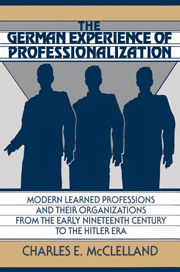 The German Experience of Professionalization
The German Experience of Professionalization Book contents
- Frontmatter
- Contents
- Acknowledgments
- Abbreviations
- Part I The problem of professions in Germany
- Part II The transition to modern professions in the early nineteenth century
- Part III Unified professions in a unified Germany?
- Part IV Breakthroughs and breakdowns: The professions enter the era of cartels and unions
- 8 The “free” professions, 1900–1918
- 9 Law-based professions, 1900–1918
- Part V The Weimar era
- Part VI The fate of professions under and after fascism
- A word about sources
- Index
8 - The “free” professions, 1900–1918
Published online by Cambridge University Press: 06 July 2010
- Frontmatter
- Contents
- Acknowledgments
- Abbreviations
- Part I The problem of professions in Germany
- Part II The transition to modern professions in the early nineteenth century
- Part III Unified professions in a unified Germany?
- Part IV Breakthroughs and breakdowns: The professions enter the era of cartels and unions
- 8 The “free” professions, 1900–1918
- 9 Law-based professions, 1900–1918
- Part V The Weimar era
- Part VI The fate of professions under and after fascism
- A word about sources
- Index
Summary
As argued in previous chapters, some German professional groups had achieved a number of innovations and changes by the turn of the twentieth century that satisfied at least part of their professionalizing programs. At the same time, none could be described as completely satisfied with the status quo. As we shall see in this chapter, the last two decades of the German Empire brought both widening conflict and some degree of resolution for professional groups.
A certain measure of discontent and instability emerged from the very dynamics of the economic, social, and cultural change in these important years. To mention one dynamic, specialization came increasingly to characterize much professional activity, not only in such science and technology-based occupations as engineering, chemistry, and medicine, but in law and teaching as well. The organizational consequences of specialization could be harmless to professionalization, as when gynecologists and physical chemists wished to found their own societies and journals; but it could also lead to fragmentation of the power and force of central professional organizations.
Another centrifugal force that emerged especially strongly before World War I might be called “labor unionism.” The threat of socialist revolution and, perhaps even more concretely, of successful union agitation and strikes had haunted the sleep of the German authorities and property owners increasingly in the 1890s. By the turn of the century, bourgeois or not, some German professionals were beginning the turn to the union model of occupational organization and adapt it to professional use.
- Type
- Chapter
- Information
- The German Experience of ProfessionalizationModern Learned Professions and their Organizations from the Early Nineteenth Century to the Hitler Era, pp. 131 - 152Publisher: Cambridge University PressPrint publication year: 1991


